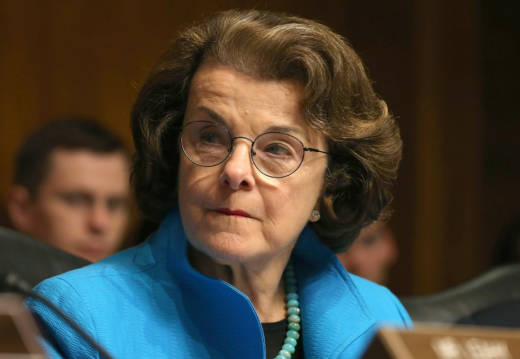Feinstein is right that the column focused more on actuarial tables than actual results of her career.
But there's no denying that the energy in the Democratic Party is currently with the far left, as evidenced by the single-payer advocates who gave Feinstein so much trouble at a town hall meeting in April. For all her accomplishments, Feinstein's claim that she's a liberal is not entirely accurate.
In her KQED interview, Feinstein acknowledged that "I may not be as liberal as some ... maybe not to the extent of Bernie Sanders. But certainly that's been my history as a mayor (of San Francisco) for nine years."
Those who were present for her mayoralty would beg to differ. Feinstein took office under the worst of circumstances the day in November 1978 that Mayor George Moscone and Supervisor Harvey Milk were assassinated in City Hall. Anyone who saw the video of Feinstein that day knows she was a tower of strength and composure. She did an extraordinary job pulling the city together in its darkest hour and afterward.
But to say she was a liberal mayor doesn't entirely comport with history. Among other things, she vetoed a piece of legislation that would have allowed women to get equal pay for equal work.
And in 1982 she vetoed legislation to allow same-sex couples to register as domestic partners and receive benefits like health insurance. At the time, she said, "I must believe in what I am defending. I would love to go out and defend a document for the changing lifestyles we have in our city. This is not that document."
Twenty-two years later, after Mayor Gavin Newsom allowed same-sex couples to marry in San Francisco, Feinstein, then a U.S. senator, said it contributed to John Kerry's loss to President George W. Bush. "So I think what the whole issue has been too much, too fast, too soon," Sen. Feinstein said. "And people aren't ready for it."
Of course, many would agree. In fairness, as mayor, Dianne Feinstein took the lead in developing an extensive model of AIDS support services when other officials, like President Reagan and New York City Mayor Ed Koch, mostly looked the other way. It became known as "the San Francisco model," and the gay community was deeply grateful for it.
Whether Feinstein is "liberal enough" is unlikely to determine whether or not she wins another six-year term. If she runs, she likely clears the field and wins.
"I'm at a position now, and some say it's seniority and I think some of it is drive, to be able to get even more done," Feinstein told KQED.
Feinstein gives every indication she's running, but given her age and, more importantly, health challenges faced by husband Richard Blum, she still has time to change her mind. If she does, stand back lest you get run over by a horde of ambitious Democrats seeking to succeed her.
Correction: The original version of this story incorrectly stated that Utah Senator Orrin Hatch is the second oldest U.S. Senator. In fact, he's the third oldest. The second oldest is Iowa Republican Charles Grassley. He is three months younger than Sen. Feinstein.
